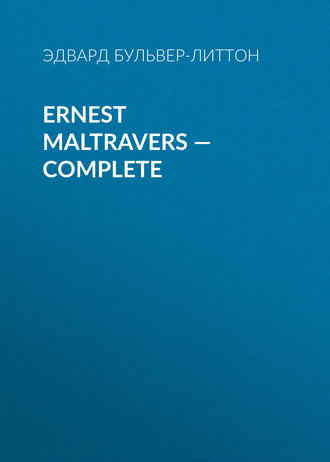
Эдвард Бульвер-Литтон
Ernest Maltravers — Complete
CHAPTER XI
“Strange fits of passion I have known.
And I will dare to tell.”
—WORDSWORTH.
Is meditated action.”
—WORDSWORTH.
MALTRAVERS left Doningdale the next day. He had no further conversation with Valerie; but when he took leave of her, she placed in his hand a letter, which he read as he rode slowly through the beech avenues of the park. Translated, it ran thus:
“Others would despise me for the weakness I showed—but you will not! It is the sole weakness of a life. None can know what I have passed through—what hours of dejection and gloom. I, whom so many envy! Better to have been a peasant girl, with love, than a queen whose life is but a dull mechanism. You, Maltravers, I never forgot in absence; and your image made yet more wearisome and trite the things around me. Years passed, and your name was suddenly on men’s lips. I heard of you wherever I went—I could not shut you from me. Your fame was as if you were conversing by my side. We met at last, suddenly and unexpectedly. I saw that you loved me no more, and that thought conquered all my resolves: anguish subdues the nerves of the mind as sickness those of the body. And thus I forgot, and humbled, and might have undone myself. Juster and better thoughts are once more awakened within me, and when we meet again I shall be worthy of your respect. I see how dangerous are that luxury of thought, that sin of discontent which I indulged. I go back to life, resolved to vanquish all that can interfere with its claims and duties. Heaven guide and preserve you, Ernest. Think of me as one whom you will not blush to have loved—whom you will not blush hereafter to present to your wife. With so much that is soft, as well as great within you, you were not formed like me—to be alone.
“FAREWELL!”
Maltravers read, and re-read this letter; and when he reached his home, he placed it carefully amongst the things he most valued. A lock of Alice’s hair lay beside it—he did not think that either was dishonoured by the contact.
With an effort, he turned himself once more to those stern yet high connections which literature makes with real life. Perhaps there was a certain restlessness in his heart which induced him ever to occupy his mind. That was one of the busiest years of his life—the one in which he did most to sharpen jealousy and confirm fame.
CHAPTER XII
“In effect he entered my apartment.”
—Gil Blas.
“‘I am surprised,’ said he, ‘at the caprice of Fortune, who sometimes delights in loading an execrable author with favours, whilst she leaves good writers to perish for want.’”
—Gil Blas.
IT was just twelve months after his last interview with Valerie, and Madame de Ventadour had long since quitted England, when one morning, as Maltravers sat alone in his study, Castruccio Cesarini was announced.
“Ah, my dear Castruccio, how are you?” cried Maltravers, eagerly, as the opening door presented the form of the Italian.
“Sir,” said Castruccio, with great stiffness, and speaking in French, which was his wont when he meant to be distant—“sir, I do not come to renew our former acquaintance—you are a great man [here a bitter sneer], I an obscure one [here Castruccio drew himself up]—I only come to discharge a debt to you which I find I have incurred.”
“What tone is this, Castruccio; and what debt do you speak of?”
“On my arrival in town yesterday,” said the poet solemnly, “I went to the man whom you deputed some years since to publish my little volume, to demand an account of its success; and I found that it had cost one hundred and twenty pounds, deducting the sale of forty-nine copies which had been sold. Your books sell some thousands, I am told. It is well contrived—mine fell still-born, no pains were taken with it—no matter—[a wave of the hand]. You discharged this debt, I repay you: there is a cheque for the money. Sir, I have done! I wish you a good day, and health to enjoy your reputation.”
“Why, Cesarini, this is folly.”
“Sir—”
“Yes, it is folly; for there is no folly equal to that of throwing away friendship in a world where friendship is so rare. You insinuate that I am to blame for any neglect which your work experienced. Your publisher can tell you that I was more anxious about your book than I have ever been about my own.”
“And the proof is that forty-nine copies were sold!”
“Sit down, Castruccio; sit down, and listen to reason;” and Maltravers proceeded to explain, and soothe, and console. He reminded the poor poet that his verses were written in a foreign tongue—that even English poets of great fame enjoyed but a limited sale for their works—that it was impossible to make the avaricious public purchase what the stupid public would not take an interest in—in short, he used all those arguments which naturally suggested themselves as best calculated to convince and soften Castruccio; and he did this with so much evident sympathy and kindness, that at length the Italian could no longer justify his own resentment. A reconciliation took place, sincere on the part of Maltravers, hollow on the part of Cesarini; for the disappointed author could not forgive the successful one.
“And how long shall you stay in London?”
“Some months.”
“Send for your luggage, and be my guest.”
“No; I have taken lodgings that suit me. I am formed for solitude.”
“While you stay here, you will, however, go into the world.”
“Yes, I have some letters of introduction, and I hear that the English can honour merit, even in an Italian.”
“You hear the truth, and it will amuse you, at least, to see our eminent men. They will receive you most hospitably. Let me assist you as a cicerone.”
“Oh, your valuable time!”
“Is at your disposal: but where are you going?”
“It is Sunday, and I have had my curiosity excited to hear a celebrated preacher—Mr. ———, who they tell me, is now more talked of than any author in London.”
“They tell you truly—I will go with you—I myself have not yet heard him, but proposed to do so this very day.”
“Are you not jealous of a man so much spoken of?”
“Jealous!—why, I never set up for a popular preacher!—ce n’est pas mon metier.”
“If I were a successful author, I should be jealous if the dancing-dogs were talked of.”
“No, my dear Cesarini, I am sure you would not. You are a little irritated at present by natural disappointment; but the man who has as much success as he deserves is never morbidly jealous, even of a rival in his own line. Want of success sours us; but a little sunshine smiles away the vapours. Come, we have no time to lose.”
Maltravers took his hat, and the two young men bent their way to ——— Chapel. Cesarini still retained the singular fashion of his dress, though it was now made of handsomer materials, and worn with more coxcombry and pretension. He had much improved in person—had been admired in Paris, and told that he looked like a man of genius—and, with his black ringlets flowing over his shoulders, his long moustache, his broad Spanish-shaped hat, and eccentric garb, he certainly did not look like other people. He smiled with contempt at the plain dress of his companion. “I see,” said he, “that you follow the fashion, and look as if you passed your life with elegans instead of students. I wonder you condescend to such trifles as fashionably-shaped hats and coats.”
“It would be worse trifling to set up for originality in hats and coats, at least in sober England. I was born a gentleman, and I dress my outward frame like others of my order. Because I am a writer, why should I affect to be different from other men?”
“I see that you are not above the weakness of your countryman Congreve,” said Cesarini, “who deemed it finer to be a gentleman than an author.”
“I always thought that anecdote misconstrued. Congreve had a proper and manly pride, to my judgment, when he expressed a dislike to be visited merely as a raree-show.”
“But is it policy to let the world see that an author is like other people? Would he not create a deeper personal interest if he showed that even in person alone he was unlike the herd? He ought to be seen seldom—not to stale his presence—and to resort to the arts that belong to the royalty of intellect as well as the royalty of birth.”
“I dare say an author, by a little charlatanism of that nature, might be more talked of—might be more adored in the boarding-schools, and make a better picture in the exhibition. But I think, if his mind be manly, he would lose in self-respect at every quackery of the sort. And my philosophy is, that to respect oneself is worth all the fame in the world.”
Cesarini sneered and shrugged his shoulders; it was quite evident that the two authors had no sympathy with each other.
They arrived at last at the chapel, and with some difficulty procured seats.
Presently the service began. The preacher was a man of unquestionable talent and fervid eloquence; but his theatrical arts, his affected dress, his artificial tones and gestures; and, above all, the fanatical mummeries which he introduced into the House of God, disgusted Maltravers, while they charmed, entranced, and awed Cesarini. The one saw a mountebank and impostor—the other recognised a profound artist and an inspired prophet.
But while the discourse was drawing towards a close, while the preacher was in one of his most eloquent bursts—the ohs! and ahs! of which were the grand prelude to the pathetic peroration—the dim outline of a female form, in the distance, riveted the eyes and absorbed the thoughts of Maltravers. The chapel was darkened, though it was broad daylight; and the face of the person that attracted Ernest’s attention was concealed by her head-dress and veil. But that bend of the neck, so simply graceful, so humbly modest, recalled to his heart but one image. Every one has, perhaps, observed that there is a physiognomy (if the bull may be pardoned) of form as well as face, which it rarely happens that two persons possess in common. And this, with most, is peculiarly marked in the turn of the head, the outline of the shoulders, and the ineffable something that characterises the postures of each individual in repose. The more intently he gazed, the more firmly Ernest was persuaded that he saw before him the long-lost, the never-to-be-forgotten mistress of his boyish days, and his first love. On one side of the lady in question sat an elderly gentleman, whose eyes were fixed upon the preacher; on the other, a beautiful little girl, with long fair ringlets, and that cast of features which, from its exquisite delicacy and expressive mildness, painters and poets call the “angelic.” These persons appeared to belong to the same party. Maltravers literally trembled, so great were his impatience and agitation. Yet still, the dress of the supposed likeness of Alice, the appearance of her companions, were so evidently above the ordinary rank, that Ernest scarcely ventured to yield to the suggestions of his own heart. Was it possible that the daughter of Luke Darvil, thrown upon the wide world, could have risen so far beyond her circumstances and station? At length the moment came when he might resolve his doubts—the discourse was concluded—the extemporaneous prayer was at an end—the congregation broke up, and Maltravers pushed his way, as well as he could, through the dense and serried crowd. But every moment some vexatious obstruction, in the shape of a fat gentleman or three close-wedged ladies, intercepted his progress. He lost sight of the party in question amidst the profusion of tall bonnets and waving plumes. He arrived at last, breathless and pale as death (so great was the struggle within him), at the door of the chapel. He arrived in time to see a plain carriage with servants in grey undress liveries, driving from the porch—and caught a glimpse, within the vehicle, of the golden ringlets of a child. He darted forward, he threw himself almost before the horses. The coachman drew in, and with an angry exclamation, very much like an oath, whipped his horses aside and went off. But that momentary pause sufficed.—“It is she—it is! O Heaven, it is Alice!” murmured Maltravers. The whole place reeled before his eyes, and he clung, overpowered and unconscious, to a neighbouring lamp-post for support. But he recovered himself with an agonising effort, as the thought struck upon this heart that he was about to lose sight of her again for ever. And he rushed forward, like one frantic, in pursuit of the carriage. But there was a vast crowd of other carriages, besides stream upon stream of foot-passengers,—for the great and the gay resorted to that place of worship, as a fashionable excitement in a dull day. And after a weary and a dangerous chase, in which he had been nearly run over three times, Maltravers halted at last, exhausted and in despair. Every succeeding Sunday, for months, he went to the same chapel, but in vain; in vain, too, he resorted to every public haunt of dissipation and amusement. Alice Darvil he beheld no more!
CHAPTER XIII
“Tell me, sir,
Have you cast up your state, rated your land,
And find it able to endure the charge?”
The Noble Gentleman.
By degrees, as Maltravers sobered down from the first shock of that unexpected meeting, and from the prolonged disappointment that followed it, he became sensible of a strange kind of happiness or contentment. Alice was not in poverty, she was not eating the unhallowed bread of vice, or earning the bitter wages of laborious penury. He saw her in reputable, nay, opulent circumstances. A dark nightmare, that had often, amidst the pleasures of youth, or the triumphs of literature, weighed upon his breast, was removed. He breathed more freely—he could sleep in peace. His conscience could no longer say to him, “She who slept upon thy bosom is a wanderer upon the face of the earth—exposed to every temptation, perishing perhaps for want.” That single sight of Alice had been like the apparition of the injured Dead conjured up at Heraclea—whose sight could pacify the aggressor and exorcise the spectres of remorse. He was reconciled with himself, and walked on to the Future with a bolder step and a statelier crest. Was she married to that staid and sober-looking personage whom he had beheld with her? was that child the offspring of their union? He almost hoped so—it was better to lose than to destroy her. Poor Alice! could she have dreamed, when she sat at his feet gazing up into his eyes, that a time would come when Maltravers would thank Heaven for the belief that she was happy with another?
Ernest Maltravers now felt a new man: the relief of conscience operated on the efforts of his genius. A more buoyant and elastic spirit entered into them—they seemed to breathe as with a second youth.
Meanwhile, Cesarini threw himself into the fashionable world, and to his own surprise was feted and caressed. In fact, Castruccio was exactly the sort of person to be made a lion of. The letters of introduction that he had brought from Paris were addressed to those great personages in England between whom and personages equally great in France politics makes a bridge of connection. Cesarini appeared to them as an accomplished young man, brother-in-law to a distinguished member of the French Chamber. Maltravers, on the other hand, introduced him to the literary dilettanti, who admire all authors that are not rivals. The singular costume of Cesarini, which would have revolted persons in an Englishman, enchanted them in an Italian. He looked, they said, like a poet. Ladies like to have verses written to them, and Cesarini, who talked very little, made up for it by scribbling eternally. The young man’s head soon grew filled with comparisons between himself in London and Petrarch at Avignon. As he had always thought that fame was in the gift of lords and ladies, and had no idea of the multitude, he fancied himself already famous. And, since one of his strongest feelings was his jealousy of Maltravers, he was delighted at being told he was a much more interesting creature than that haughty personage, who wore his neckcloth like other people, and had not even those indispensable attributes of genius—black curls and a sneer. Fine society, which, as Madame de Stael well says, depraves the frivolous mind and braces the strong one, completed the ruin of all that was manly in Cesarini’s intellect. He soon learned to limit his desire of effect or distinction to gilded saloons; and his vanity contented itself upon the scraps and morsels from which the lion heart of true ambition turns in disdain. But this was not all. Cesarini was envious of the greater affluence of Maltravers. His own fortune was in a small capital of eight or nine thousand pounds: but, thrown in the midst of the wealthiest society in Europe, he could not bear to sacrifice a single claim upon its esteem. He began to talk of the satiety of wealth, and young ladies listened to him with remarkable interest when he did so—he obtained the reputation of riches—he was too vain not to be charmed with it. He endeavoured to maintain the claim by adopting the extravagant excesses of the day. He bought horses—he gave away jewels—he made love to a marchioness of forty-two, who was very kind to him and very fond of ecarte—he gambled—he was in the high road to destruction.
BOOK VI
Perchance you say that gold’s the arch-exceller,
And to be rich is sweet?
—EURIP. Ion., line 641.
* * * ‘Tis not to be endured,
To yield our trodden path and turn aside,
Giving our place to knaves.
—Ibid., line 648
CHAPTER I
“L’adresse et l’artifice out passe dans mon coeur;
Qu’ou a sous cet habit et d’esprit et de ruse.”16
—REGNARD.
IT was a fine morning in July, when a gentleman who had arrived in town the night before—after an absence from England of several years—walked slowly and musingly up the superb thoroughfare which connects the Regent’s park with St. James’s.
He was a man, who, with great powers of mind, had wasted his youth in a wandering vagabond kind of life, but who had worn away the love of pleasure, and began to awaken to a sense of ambition.
“It is astonishing how this city is improved,” said he to himself. “Everything gets on in this world with a little energy and bustle—and everybody as well as everything. My old cronies, fellows not half so clever as I am, are all doing well. There’s Tom Stevens, my very fag at Eton—snivelling little dog he was too!—just made under-secretary of state. Pearson, whose longs and shorts I always wrote, is now head-master to the human longs and shorts of a public school—editing Greek plays, and booked for a bishopric. Collier, I see by the papers, is leading his circuit—and Ernest Maltravers (but he had some talent) has made a name in the world. Here am I, worth them all put together, who have done nothing but spend half my little fortune in spite of all my economy. Egad, this must have an end. I must look to the main chance; and yet, just when I want his help the most, my worthy uncle thinks fit to marry again. Humph—I’m too good for this world.”
While thus musing, the soliloquist came in direct personal contact with a tall gentleman, who carried his head very high in the air, and did not appear to see that he had nearly thrown our abstracted philosopher off his legs.
“Zounds, sir, what do you mean?” cried the latter.
“I beg your par—” began the other, meekly, when his arm was seized, and the injured man exclaimed, “Bless me, sir, is it indeed you whom I see?”
“Ha!—Lumley?”
“The same; and how fares it, any dear uncle? I did not know you were in London. I only arrived last night. How well you are looking!”
“Why, yes, Heaven be praised, I am pretty well.”
“And happy in your new ties? You must present me to Mrs. Templeton.”
“Ehem,” said Mr. Templeton, clearing his throat, and with a slight but embarrassed smile, “I never thought I should marry again.”
“L’homme propose et Dieu dispose,” observed Lumley Ferrers; for it was he.
“Gently, my dear nephew,” replied Mr. Templeton, gravely; “those phrases are somewhat sacrilegious; I am an old-fashioned person, you know.”
“Ten thousand apologies.”
“One apology will suffice; these hyperboles of phrase are almost sinful.”
“Confounded old prig!” thought Ferrers; but he bowed sanctimoniously.
“My dear uncle, I have been a wild fellow in my day; but with years comes reflection; and under your guidance, if I may hope for it, I trust to grow a wiser and a better man.”
“It is well, Lumley,” returned the uncle, “and I am very glad to see you returned to your own country. Will you dine with me to-morrow? I am living near Fulham. You had better bring your carpet-bag, and stay with me some days; you will be heartily welcome, especially if you can shift without a foreign servant. I have a great compassion for papists, but—”
“Oh, my dear uncle, do not fear; I am not rich enough to have a foreign servant, and have not travelled over three-quarters of the globe without learning that it is possible to dispense with a valet.”
“As to being rich enough,” observed Mr. Templeton, with a calculating air, “seven hundred and ninety-five pounds ten shillings a year will allow a man to keep two servants, if he pleases; but I am glad to find you economical at all events. We meet to-morrow, then, at six o’clock.”
“Au revoir—I mean, God bless you.
“Tiresome old gentleman that,” muttered Ferrers, “and not so cordial as formerly; perhaps his wife is enceinte, and he is going to do me the injustice of having another heir. I must look to this; for without riches, I had better go back and live au cinquieme at Paris.”
With this conclusion, Lumley quickened his pace, and soon arrived at Seamore Place. In a few moments more he was in the library well stored with books, and decorated with marble busts and images from the studios of Canova and Thorwaldsen.
“My master, sir, will be down immediately,” said the servant who admitted him; and Ferrers threw himself on a sofa, and contemplated the apartment with an air half envious and half cynical.
Presently the door opened, and “My dear Ferrers!” “Well, mon cher, how are you?” were the salutations hastily exchanged.
After the first sentences of inquiry, gratulation, and welcome, had cleared the way for more general conversation,—“Well, Maltravers,” said Ferrers, “so here we are together again, and after a lapse of so many years! both older, certainly; and you, I suppose, wiser. At all events, people think you so; and that’s all that’s important in the question. Why, man, you are looking as young as ever, only a little paler and thinner; but look at me—I am not very much past thirty, and I am almost an old man; bald at the temples, crows’ feet, too, eh! Idleness ages one damnably.”
“Pooh, Lumley, I never saw you look better. And are you really come to settle in England?”
“Yes, if I can afford it. But at my age, and after having seen so much, the life of an idle, obscure garcon does not content me. I feel that the world’s opinion, which I used to despise, is growing necessary to me. I want to be something. What can I be? Don’t look alarmed, I won’t rival you. I dare say literary reputation is a fine thing, but I desire some distinction more substantial and worldly. You know your own country; give me a map of the roads to Power.”
“To Power! Oh, nothing but law, politics, and riches.”
“For law I am too old; politics, perhaps, might suit me; but riches, my dear Ernest—ah, how I long for a good account with my banker!”
“Well, patience and hope. Are you are not a rich uncle’s heir?”
“I don’t know,” said Ferrers, very dolorously; “the old gentleman has married again, and may have a family.”
“Married!—to whom?”
“A widow, I hear; I know nothing more, except that she has a child already. So you see she has got into a cursed way of having children. And perhaps, by the time I’m forty, I shall see a whole covey of cherubs flying away with the great Templeton property!”
“Ha, ha; your despair sharpens your wit, Lumley; but why not take a leaf out of your uncle’s book, and marry yourself?”
“So I will when I can find an heiress. If that is what you meant to say—it is a more sensible suggestion than any I could have supposed to come from a man who writes books, especially poetry: and your advice is not to be despised. For rich I will be; and as the fathers (I don’t mean of the Church, but in Horace) told the rising generation, the first thing is to resolve to be rich, it is only the second thing to consider how.”
“Meanwhile, Ferrers, you will be my guest.”
“I’ll dine with you to-day; but to-morrow I am off to Fulham, to be introduced to my aunt. Can’t you fancy her?—grey gros-de-Naples gown: gold chain with an eyeglass; rather fat; two pugs, and a parrot! ‘Start not, this is fancy’s sketch!’ I have not yet seen the respectable relative with my physical optics. What shall we have for dinner? Let me choose, you were always a bad caterer.” As Ferrers thus rattled on, Maltravers felt himself growing younger: old times and old adventures crowded fast upon him; and the two friends spent a most agreeable day together. It was only the next morning that Maltravers, in thinking over the various conversations that had passed between them, was forced reluctantly to acknowledge that the inert selfishness of Lumley Ferrers seemed now to have hardened into a resolute and systematic want of principle, which might, perhaps, make him a dangerous and designing man, if urged by circumstances into action.







